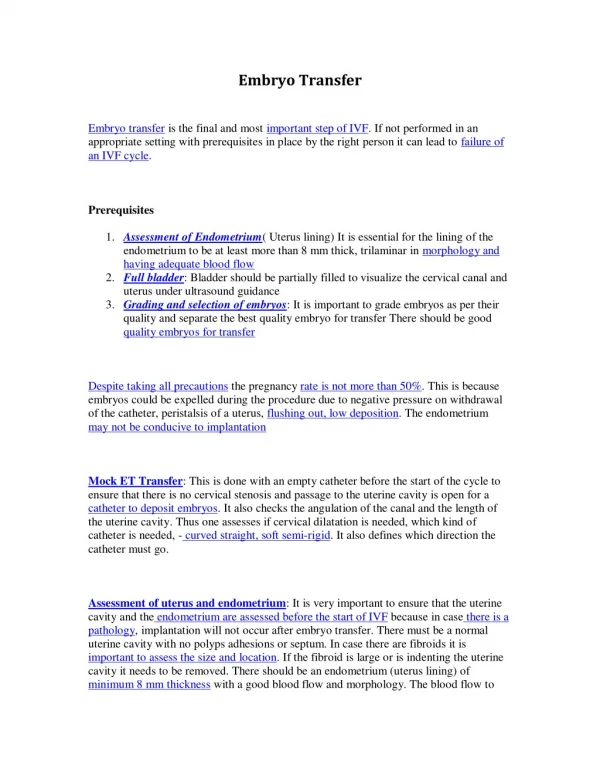best test tube baby center in delhi-www.ivf-india.co.in
Embryo transfer is the final and most important step of IVF. If not performed in an appropriate setting with prerequisites in place by the right person it can lead to failure of an IVF cycle. Prerequisites 1. Assessment of Endometrium( Uterus lining) It is essential for the lining of the endometrium to be at least more than 8 mm thick, trilaminar in morphology and having adequate blood flow 2. Full bladder: Bladder should be partially filled to visualize the cervical canal and uterus under ultrasound guidance 3. Grading and selection of embryos: It is important to grade embryos as per their quality and separate the best quality embryo for transfer There should be good quality embryos for transfer Despite taking all precautions the pregnancy rate is not more than 50%. This is because embryos could be expelled during the procedure due to negative pressure on withdrawal of the catheter, peristalsis of a uterus, flushing out, low deposition. The endometrium may not be conducive to implantation Mock ET Transfer: This is done with an empty catheter before the start of the cycle to ensure that there is no cervical stenosis and passage to the uterine cavity is open for a catheter to deposit embryos. It also checks the angulation of the canal and the length of the uterine cavity. Thus one assesses if cervical dilatation is needed, which kind of catheter is needed, - curved straight, soft semi-rigid. It also defines which direction the catheter must go. Assessment of uterus and endometrium: It is very important to ensure that the uterine cavity and the endometrium are assessed before the start of IVF because in case there is a pathology, implantation will not occur after embryo transfer. There must be a normal uterine cavity with no polyps adhesions or septum. In case there are fibroids it is important to assess the size and location. If the fibroid is large or is indenting the uterine cavity it needs to be removed. There should be an endometrium (uterus lining) of minimum 8 mm thickness with a good blood flow and morphology. The blood flow to endometrium is assessed by Doppler ultrasound. In case this is not their embryo transfer should be deferred. Day of Embryo Transfer Embryo transfer can be done on day 2, day 3, or day 5 of the embryo. Day 5 embryo transfer is preferred as better embryo can be selected hence giving a higher success rate.
★
★
★
★
★
43 views • 3 slides





